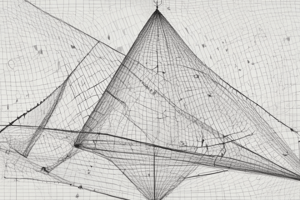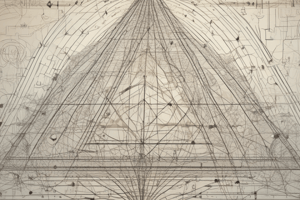Podcast
Questions and Answers
Which of the following is a fundamental concept of classical mechanics?
Which of the following is a fundamental concept of classical mechanics?
- Newton's laws of motion (correct)
- Euler's theorem
- Pythagorean theorem
- Integral calculus
What is the primary focus of the first law of thermodynamics?
What is the primary focus of the first law of thermodynamics?
- The relationship between pressure and volume
- Force equals mass times acceleration
- The principle of energy conservation (correct)
- The conservation of momentum
In calculus, which concept is essential for analyzing motion?
In calculus, which concept is essential for analyzing motion?
- Vector operations
- Variables and constants
- Derivatives (correct)
- Statistical distributions
Which statistical measure represents the middle value in a data set?
Which statistical measure represents the middle value in a data set?
Which mathematical concept is critical for understanding wave properties such as frequency and wavelength?
Which mathematical concept is critical for understanding wave properties such as frequency and wavelength?
Study Notes
Math
Key Concepts
-
Algebra
- Variables and constants
- Equations and inequalities
- Functions and graphs
-
Geometry
- Shapes (triangles, circles, polygons)
- Area, perimeter, and volume calculations
- Theorems (Pythagorean theorem, congruence, similarity)
-
Calculus
- Limits and continuity
- Derivatives and their applications
- Integrals and the Fundamental Theorem of Calculus
-
Statistics
- Descriptive statistics (mean, median, mode)
- Probability concepts (independent vs. dependent events)
- Distributions (normal distribution, binomial distribution)
-
Linear Algebra
- Vectors and matrices
- Determinants and eigenvalues
- Systems of linear equations
Physics
Key Concepts
-
Classical Mechanics
- Newton's laws of motion
- Concepts of force, mass, and acceleration
- Work, energy, and power
-
Thermodynamics
- Laws of thermodynamics (first and second laws)
- Concepts of heat, temperature, and entropy
- Heat engines and efficiency
-
Waves and Oscillations
- Properties of waves (frequency, wavelength, amplitude)
- Types of waves (mechanical, electromagnetic)
- Simple harmonic motion
-
Electricity and Magnetism
- Ohm's law (V = IR)
- Concepts of voltage, current, and resistance
- Electromagnetic fields and Faraday's law of induction
-
Modern Physics
- Theory of relativity (special and general)
- Quantum mechanics basics (wave-particle duality, uncertainty principle)
- Atomic structure (electrons, protons, neutrons)
Interrelation of Math and Physics
- Mathematical models describe physical phenomena.
- Calculus is crucial for understanding motion and change in physics.
- Geometry is essential for optics and wave mechanics.
- Statistics is used in quantum mechanics and data analysis in experiments.
Algebra
- Represents unknown quantities with variables and uses constants for fixed amounts.
- Solves equations and inequalities to find the value of variables.
- Explores relationships between variables using functions, represented by graphs.
Geometry
- Studies different shapes, including triangles, circles, polygons.
- Calculates area and perimeter of shapes and volume of 3D figures.
- Uses theorems to solve problems, including the Pythagorean theorem, congruence, and similarity.
Calculus
- Analyzes the behavior of functions with concepts like limits and continuity.
- Uses derivatives to determine the rate of change of a function and analyze its maximum and minimum points.
- Uses integrals to find areas under curves and to calculate accumulated change over time.
Statistics
- Summarizes data with measures like mean, median, and mode.
- Helps understand the likelihood of events happening, distinguishing between independent and dependent events.
- Studies different types of distributions, particularly the normal and binomial distributions.
Linear Algebra
- Uses vectors and matrices to represent and solve linear equations.
- Analyzes the properties of matrices, including determinants and eigenvalues.
- Solves systems of linear equations, which have numerous applications in other fields.
Classical Mechanics
- Based on Newton's laws of motion which describe how objects move.
- Uses concepts of force, mass, and acceleration to analyze motion.
- Defines work as the energy transferred to a system by an applied force and connects work, energy, and power.
Thermodynamics
- Explores the relationship between heat, temperature, and work and energy.
- Based on the first and second laws of thermodynamics.
- Analyzes heat engines and calculates their efficiency.
Waves and Oscillations
- Studies periodic disturbances, describing their frequency, wavelength, and amplitude.
- Classifies waves as mechanical or electromagnetic and distinguishes their properties.
- Analyzes simple harmonic motion, a specific type of periodic motion.
Electricity and Magnetism
- Describes electrical circuits using Ohm's law (V = IR).
- Uses concepts of voltage, current, and resistance to analyze circuits.
- Explains the relationship between electricity and magnetism, including Faraday's law of induction.
Modern Physics
- Explores the ideas of relativity and quantum mechanics.
- Uses Einstein's theory of relativity to explain gravity and the speed of light.
- Quantum mechanics explains the wave-particle duality and the uncertainty principle of particles.
Interrelation of Math and Physics
- Mathematical models, such as equations, are essential to describe and predict physical phenomena.
- Calculus is crucial for understanding motion and change in physics, allowing analysis of forces, energies, and the evolution of systems.
- Geometry provides crucial concepts for understanding optics and wave mechanics, analyzing wave propagation, and predicting outcomes.
- Statistics is fundamental in analyzing experimental data in physics and in understanding probability in quantum mechanics.
Studying That Suits You
Use AI to generate personalized quizzes and flashcards to suit your learning preferences.
Description
Explore key concepts in mathematics and physics including algebra, geometry, calculus, and classical mechanics. This quiz covers essential theories, formulas, and applications relevant to both subjects, perfect for students and enthusiasts alike. Test your knowledge and understanding of these fundamental areas of study.




